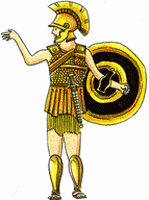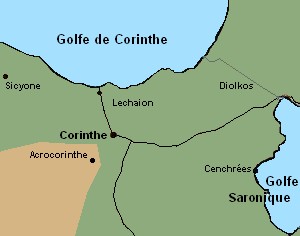Maps of the Antique
Mediterranean Sea
 Greece Greece
 Attic Attic
 Corinth Corinth
 Some dates Some dates
 Archaeological sites Archaeological sites
 Pottery and ceramics Pottery and ceramics
 Magna Graecia Magna Graecia
 Apulia Apulia
 Daunia Daunia
 Gnathia Gnathia
 Campania Campania

|
ANCIENT CORINTH

|
The exceptional destiny of Corinth is linked with its geographical situation, as a mandatory passage for ground circulation between continental Greece and Peloponnese, but also as a link between the Ionian sea and the Aegean sea, with its two ports, Lechee (Lekaion) and Cenchrees. The diolkos, a ground way for passing boats, allows even to pass forom one sea to the other. Being both a terrestrial and a maritime power, it leans against the natural fortress of Acrocorinth. Its ground is rich in sources and clay for pottery attracted the men from the Neolithic period. |
The prehistoric Corinth
Already 5000 years ago, the Ionians settled there. Bronze weapons and tools are found there. From the year 1000 B.C., various dynasties rule (Heliades, Sisyphides and Heraklides, Dorians under control of the king of Argos). About 750 B.C., the Bacchiades give the city its independence. Their people founds several colonies, among which Syracuse. The Iliad mentions the city as Ephyre. The Bacchiades were then are dethroned by tyrant Cypsélos in 657 B.C. (Bacchiades would have then emigrated to Etruria, and would have woven dynastic bonds with the Etruscan kings).
Corinth, a greek city
A little later, tyranny is replaced by an oligarchical government. Becoming a commercial and maritime Greek city, Corinth enters the complex play of alliances between cities, sometimes on Athens’ side, sometimes fighting it savagely.
When Athens tries to impose its hegemony at the end of the Vth century B.C., its support for the dissenting Corinthian colonies leads to the Peloponnesian War (431 B.C.). Corinthe will fight again at Athens’ side against Sparta, then against Philippe II of Macedonia, who however wins the battle of Cheronee. He convenes then the greek cities to form the leagues of Corinth, under Macedonian control.
About 280 B.C., Corinth takes part to a new alliance, the Achaean league, which rejects the Macedonian authority successfully, in particular under command of the stratege Aratos from Sicyone (271-213 B.C.). When the Romans arrive in Greece, Corinthe is declared free city, but the situation remains unclear. Wanting to break the league, Rome attacks Corinth in 146 B.C., and the city is devastated.
Roman Corinth
Julius Caesar decides to make Corinth a Roman colony (44 B.C.). The city is then rebuilt. When Saint Paul arrives there into 52 A.D., it is one of the most important towns of the Roman Empire.
|
|

















